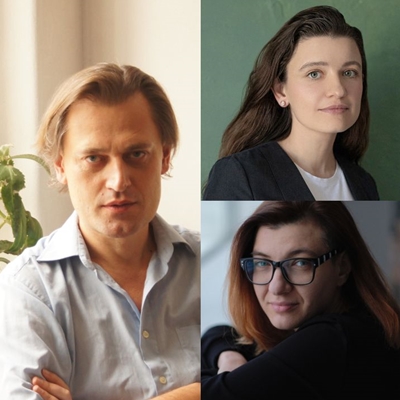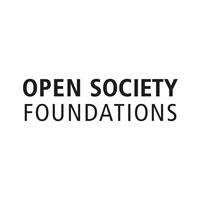Lviv BookForum 2023
Event 25
Events taking place live online 5–9 October 2023
Serhiy Hnyezdilov, Dmytro Khorkin, Lera Lauda, Natalia Lygachova, Vadym Miskyi, Svitlana Ostapa and Oleksandr Pedan
What will be the future of media in Ukraine?
Read moreThe Great War accelerated the change in media consumption habits of Ukrainians, and there will be no return to the pre-war state. However, the military media landscape will change immediately after the war. It will be influenced by technological, political, societal and global changes. The media will have a chance to increase influence, but not everyone will take advantage of this chance. At the same time, there is a risk that low-quality media will be among those who take advantage. At the discussion about the future of Ukrainian media, we will talk about communication with the young generation, hyperlocalization of media and players in this market, the future of radio and television, newly created state media. Together with our colleagues, we will outline the desired outlines of the post-war media landscape of Ukraine.
Event 18
Events taking place live online 5–9 October 2023
Yurko Prokhasko and Iryna Tsilyk, chaired by Olena Huseinova
And in the great new family, the family of the free… How do we create closeness in the conditions of war?
Read moreAs well as public and political life, conflict has a significant impact on peoples’ private lives. Families change, circles of friends decrease or expand, colleagues change, and even complete strangers can come to be extremely close.
Filmmaker Iryna Tsilyk and translator and essayist Yurko Prokhasko reflect on what relationships will be like after the war. Chaired by poet Olena Huseinova.
In partnership with Radio Culture

Event 19
Events taking place live online 5–9 October 2023
Sofia Cheliak, Oleksandra Matviichuk (digital) and Tetyana Teren, chaired by Christina Lamb
Women, war, and justice: in memory of Victoria Amelina
Read moreVictoria Amelina was a novelist, essayist and poet, and a friend of the festival, who died following a Russian missile attack in June 2023. After the invasion of Ukraine by Russia, Amelina trained as a war crimes researcher, travelling to areas liberated from Russian occupation and listening to and recording the testimonies of witnesses and survivors.
In memory of Amelina, PEN Ukraine’s executive director Tetyana Teren, program director of Lviv BookForum Sofia Cheliak and human rights lawyer Oleksandra Matviichuk talk to journalist Christina Lamb about Ukrainian women’s fight for justice. They share their future vision of the country, how victory for Ukraine will not happen without just punishment for war criminals, and why women need to be at the centre of it all.
Oleksandra Matviichuk will join remotely

Event 20
Events taking place live online 5–9 October 2023
Ed Vulliamy, Catalina Gómez Ángel, Kateryna Mikhalitsyna and Pavlo Vyshebaba in conversation with David Rieff
Resilience and Trauma at a time of war
Read moreJournalist and writer Ed Vulliamy, poet Pavlo Vyshebaba, writer, translator and artist Kateryna Mikhalitsyna and television presenter Catalina Gómez Ángel discuss what it is that makes people save rather than run away, and where the breaking point is in times of conflict. They also speak about psychological resilience versus breakdown in the face of the trauma of the war. Chaired by David Rieff.
Closed captions are available for this event in English and Spanish. Click on the "cc" icon in the video frame to select.

Event 21
Events taking place live online 5–9 October 2023
Kateryna Lykhohliad, Kateryna Mikhalitsyna, Iryna Novitska and Olena Rybka, chaired by Tetyana Teren
Occupation diaries. In memory of Volodymyr Vakulenko
Read morePresentation of the book by Volodymyr Vakulenko-K. I'm turning..., which included the occupation diary the writer kept in February-March 2022 and his selected poems. The book will be published by Vivat publishing house.
Diary of Volodymyr Vakulenko-K. – painful and truthful records that contained his thoughts and observations from the beginning of the full-scale invasion and during the occupation of Izyum and his native village of Kapitolivka in the Kharkiv region. Until the abduction by the Rashists, the inevitability of which he was aware, as well as the fact that he had little chance of survival - because he is Ukrainian because he is a volunteer, and activist because he has dignity. The day before the abduction, Volodymyr buried the diary under a cherry tree in his yard, telling his father: "When ours come, give it to them." What is it like to live under occupation? What do people become? What opens before the eyes and in the heart?

Event 24
Events taking place live online 5–9 October 2023
Armando Iannucci (digital), David Schneider (digital) and Nastia Zukhvala, chaired by Oleksandha Hontar
I would laugh to keep from crying: humor and trauma
Read moreAt the beginning of the full-scale invasion of Russia on the territory of Ukraine, the whole world laughed at the memes and jokes that Ukrainians generated about any situation in leading shows. The ability to laugh while being in the epicenter of tragedy was fascinating.
Does laughter really help you get over trauma, what comedians can joke about, and who can joke about a traumatic experience?
Armando Ianucci and David Schneider will join remotely

Event 23
Events taking place live online 5–9 October 2023
Oleksandr Mykhed and Art Spiegelman in conversation (digital live event)
Read moreArt Spiegelman’s Maus is the story of Vladek Spiegelman, a Jewish survivor of Hitler's Europe, and his son, a cartoonist coming to terms with his father's story. Vladek’s story of survival – told through the diminutive where the Nazis are cats and the Jews are mice – is woven into the author's account of his tortured relationship with his ageing father.
First published in a collected volume in 1986, the comics changed the way graphic novels were seen, showing audiences and critics that the form could be used to explore complex aesthetic, moral, and cultural themes. When Spiegelman published the book’s second volume, subtitled And Here My Troubles Began, the two-volume work was awarded a special Pulitzer Prize; it remains the only graphic novel to have ever won a Pulitzer.
Spiegelman (he will join remotely) will be in conversation with writer, curator of art projects and literary scholar Oleksandr Mykhed about his life and work.
Closed captions are available for this event in English and Spanish. Click on the "cc" icon in the video frame to select.


